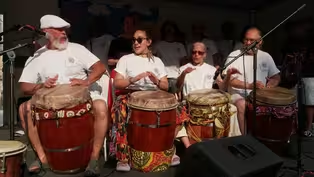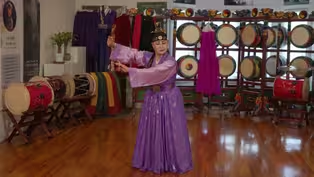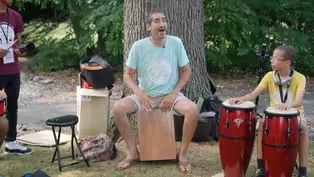State of the Arts
Storyteller: Queen Nur
Clip: Season 43 Episode 3 | 6m 36sVideo has Closed Captions
Queen Nur shares her ancestral history and preserves African culture through storytelling.
Queen Nur, an African American storyteller, performs across the U.S., Canada, and Africa, sharing ancestral history and preserving African culture through storytelling. With her extraordinary ability to captivate, she brings these tales to life for audiences, from elementary school kids to adults, in Ocean City, NJ, Jersey City, and at her home in Willingboro, NJ with her grandsons.
Problems playing video? | Closed Captioning Feedback
Problems playing video? | Closed Captioning Feedback
State of the Arts is a local public television program presented by NJ PBS
State of the Arts
Storyteller: Queen Nur
Clip: Season 43 Episode 3 | 6m 36sVideo has Closed Captions
Queen Nur, an African American storyteller, performs across the U.S., Canada, and Africa, sharing ancestral history and preserving African culture through storytelling. With her extraordinary ability to captivate, she brings these tales to life for audiences, from elementary school kids to adults, in Ocean City, NJ, Jersey City, and at her home in Willingboro, NJ with her grandsons.
Problems playing video? | Closed Captioning Feedback
How to Watch State of the Arts
State of the Arts is available to stream on pbs.org and the free PBS App, available on iPhone, Apple TV, Android TV, Android smartphones, Amazon Fire TV, Amazon Fire Tablet, Roku, Samsung Smart TV, and Vizio.
Providing Support for PBS.org
Learn Moreabout PBS online sponsorship-All of our ancestors who were in the bowels of the ships, chained, and never got a chance to bear a child and whisper, "God is great" into their ear.
We say -- Come on -- "We are your children."
I am a mother, a grandmother, a storyteller, a folklorist.
I am a Muslim.
And my name that was given to me at birth was Karen Maria Boulter, but it turned into Queen Nur, and that came to me spiritually.
♪♪ Nur is the 24th surah of the Qu'ran.
And as I looked at it, I looked at the responsibilities.
It talked about women.
Nur actually means light.
...with the empty pot.
-[Narrator 2] Storyteller Queen Nur has performed throughout the United States, Canada, and Africa.
She's a past president of the National Association of Black Storytellers and received their Zora Neale Hurston Award, among many other honors.
-And you won't believe the flowers that they had in their pots.
Can somebody tell me their favorite flower?
Anybody have a favorite flower?
Or name one.
Can you give me one?
Yes!
Well, one child had a hundred daisies in a pot!
Can somebody give me another one?
Another one?
What's your favorite one?
Yes, I am African American.
[ Laughter ] And my father told us when we were in grade school.
He said, always look for the black precedent.
I follow Jaliyaa -- a term used in Africa, in West Africa.
that means the art of storytelling.
And as an African American storyteller, I follow the tradition of the griots, the jelis, the jalis.
So my stories come from many different places.
But when I tell them, they come from my heart.
You pass on from this life into the next life.
[ Laughs ] Hoping for Paradise.
This is life.
It is just that I believe that I will not dare retreat in the forest of the ancestors.
I will be one who will be forgotten.
-[Narrator 2] Percussionist Dwight James has performed with Queen Nur for the past 17 years.
-Today I use antique cajóns, a modern cajón, and West African djembe, and a South African i-leek-ay which is mostly known as a thumb piano, and I use a North African modern drum called the pan drum.
What motivates her is history and sustaining our culture.
She's a wonderful person.
-This is Pop Pop's mother.
Grandpa Boyd was never married.
That's Lorraine.
That's my grandmother.
My beginning, in terms of being a professional storyteller -- I lost my husband in 1992.
My late husband, his name was Carl Abdul-Malik, and I had a three year old, a five year old, and a ten year old.
My daughter, the youngest one, was going to a preschool And they asked us if I could teach them about Kwanzaa.
I said you share your favorite stories.
And I read "Abiyoyo," which was written by Pete Seeger, but it's a South African tale.
It was my husband's favorite tale.
♪♪ And that same month, I took it to my son's kindergarten class.
And the two kindergarten teachers at Twin Hills Elementary said, "You ought to do this as a profession."
♪♪ 1975, I graduated from high school, and my sister, Brenda, she got me a job in Philadelphia, at the Medical Records building, there was a man named Salahuddin Abdullah.
And he would talk to me about Islam.
And I was like, "Mm, I don't know."
I said, "Look, this is a little different for me."
You know, I hadn't heard of it.
But then that same summer, I read "Malcolm X."
And when I finished reading the book, "Malcolm X," I went to work and I said, Salahuddin, I'm ready.
I went back to school in 2012 to go to college, so I became a folklorist after that.
Doll collection is a part of that.
It's part of our folk culture, and particularly my focus is African American.
-[Narrator 2] Queen Nur's doll collection was part of a recent exhibition at the Smithville Mansion in Burlington County, New Jersey.
-Molly Red is my favorite doll and the reason is, is she was a gift to me from my father.
This doll was made through the history of Topsy-Turvy dolls.
So Topsy-Turvy dolls came about because during the enslavement period, Black children were not allowed to have black face dolls, or neither they were not allowed to have white face dolls.
So the dolls were made with black faces on one side and white faces on the other, and so they were hidden until they went into their cabins and they could play with the other side.
♪ Storytelling time Clap your hands ♪ There's certain people say it kind of was a reawakening or a reconnection, but it never -- it never went away.
Even though they took our languages and they took our drums, when they found out that we were playing drums to send messages still.
It's a way for us to teach and to pass on our rich traditions and our morals and our values.
♪ You tell yours and I'll tell mine ♪ ♪ Storytelling time ♪ ♪ Clap your hands, stomp your feet, get on down ♪
Bomba y Plena: Juan Cartagena & Nanette Hernández
Video has Closed Captions
Clip: S43 Ep3 | 6m 29s | Juan Cartagena and Nanette Hernández blend social justice with Puerto Rican Bomba y Plena. (6m 29s)
Korean Dance & Drums: Lena Mija Kim
Video has Closed Captions
Clip: S43 Ep3 | 5m 32s | Lena Mija Kim, a master of Korean dance, passes the art form down to the next generation. (5m 32s)
Peruvian Cajon Player: Hector Morales
Video has Closed Captions
Clip: S43 Ep3 | 5m 24s | Hector Morales brings traditional Afro-Peruvian music to the U.S. from Lima, Peru. (5m 24s)
Providing Support for PBS.org
Learn Moreabout PBS online sponsorship

- Arts and Music
The Best of the Joy of Painting with Bob Ross
A pop icon, Bob Ross offers soothing words of wisdom as he paints captivating landscapes.












Support for PBS provided by:
State of the Arts is a local public television program presented by NJ PBS



